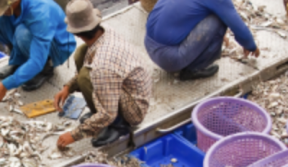Worker Empowerment
Many companies believe that they can go-it-alone and create acceptable working conditions without allowing workers a stake in deciding what this looks like. We have found again and again, however, that where workers do not have a voice, abuses persist.
In fact, we find that where workers have an active voice over their conditions, child labor and modern slavery are prevented as well. Child labor, especially bonded child labor, is among the most egregious and exploitative labor practices. It emerges wherever workers have no say over their conditions or means to escape poverty. Thus, our work to protect children is closely tied to our advocacy for living wages and collective bargaining rights.
As one Indonesian palm oil worker noted, "I often bring my children to work, despite the fact that the regulations prohibit it. I need money, so I have no choice. I bring them to help me fulfill the quota target; if I don’t fulfill it I’ll be scolded. The company does not want to know anything about the children’s pay: their pay comes from their parent’s pay" (Fatulusi’s Story, Empty Assurances). ILRF is working with unions and NGOs in Indonesia to advocate for a change to these conditions. We are modeling this campaign around successes we have had in past to this end, including in Liberia, where our child labor research helped support an independent rubber tappers union to negotiate for better wages and enlist farmers’ support to end child labor.
Collective bargaining creates decent conditions not only for children, but for adults as well. According to a report by the Center for Economic and Policy Research, union membership, more than any other factor, is likely to increase the wages and benefits of women workers. The report also showed how unionized women workers earn on average $2.00 more per hour than non-unionized women workers. In addition, union membership increases the probability that female workers will have health insurance by nearly 20%.
Defending the right to organize can help empower working women, end trafficking, curb forced and child labor, defend the rights of migrants, and even protect consumers. For more information and case studies, please see our 2009 Freedom at Work Campaign Toolkit.

